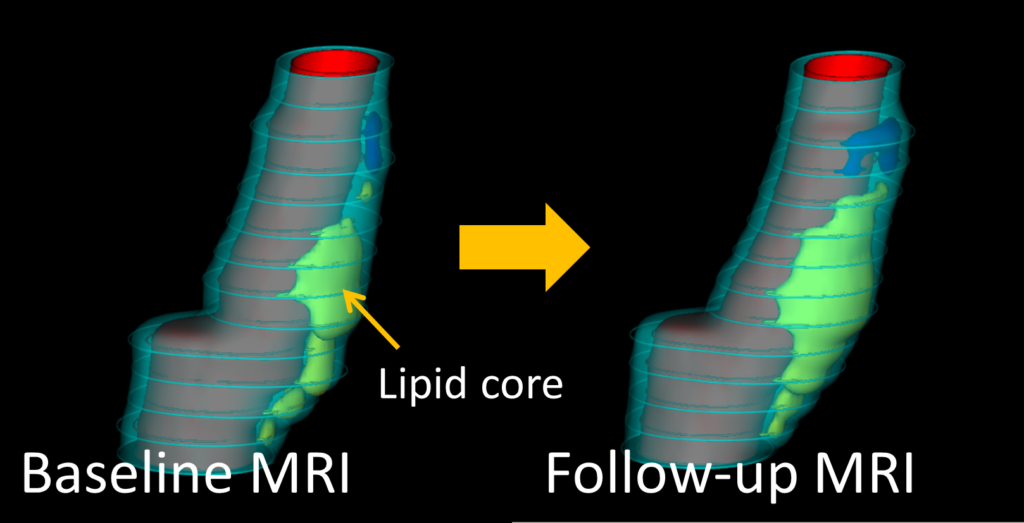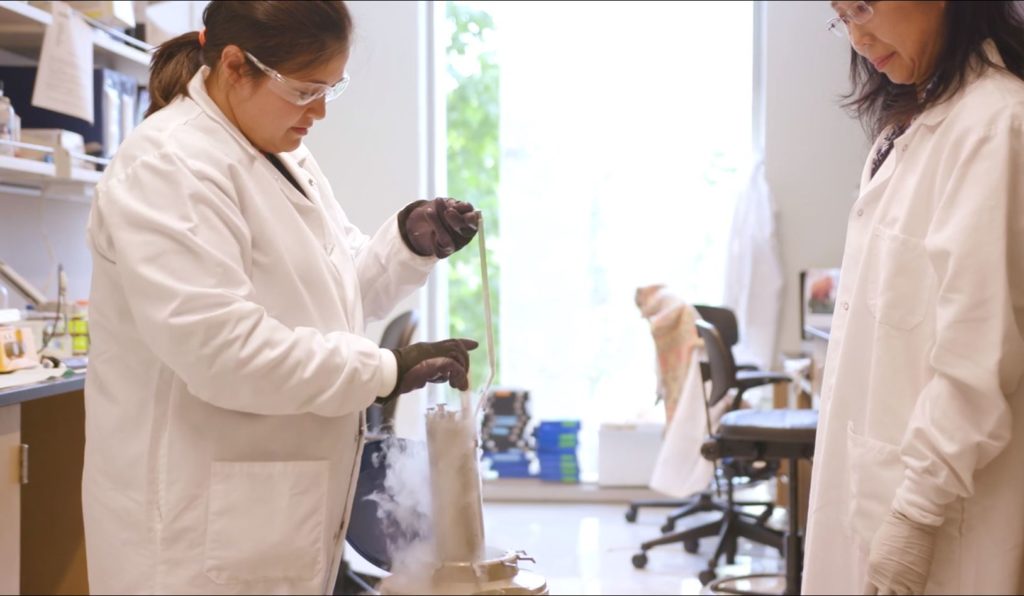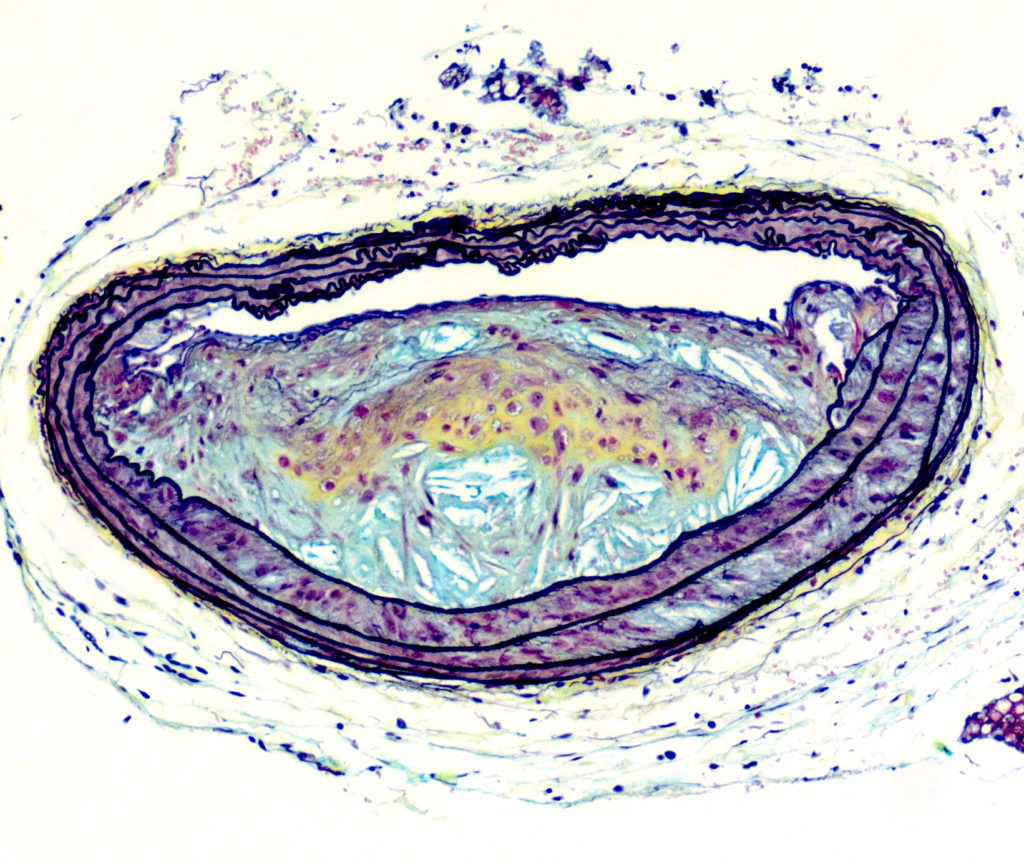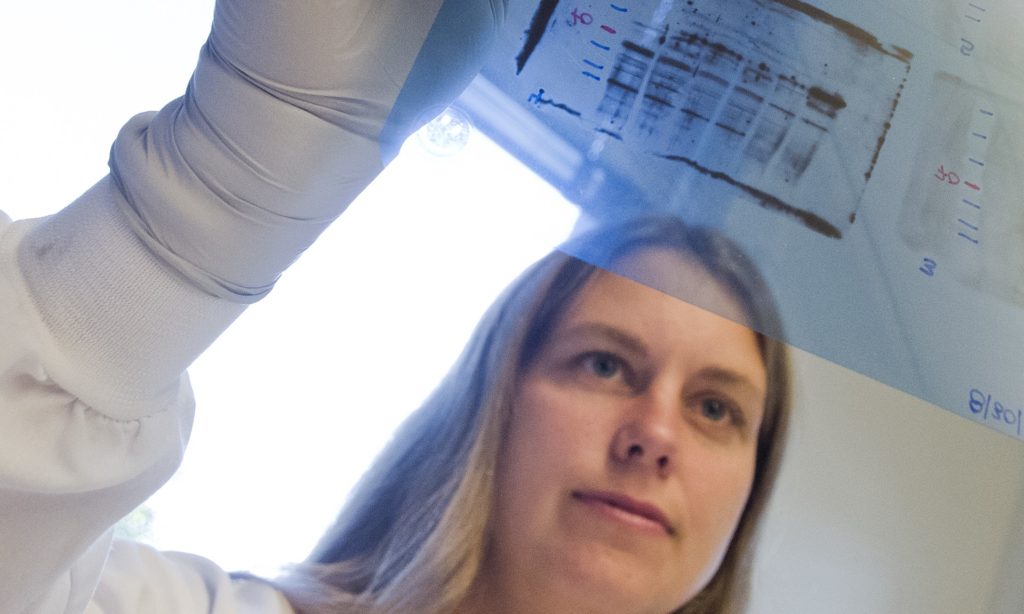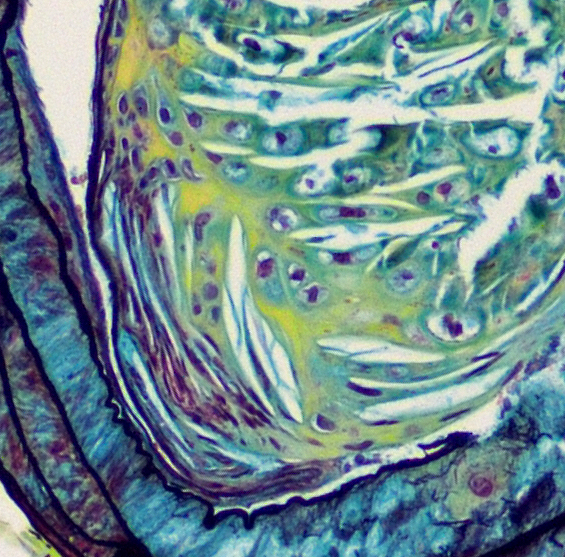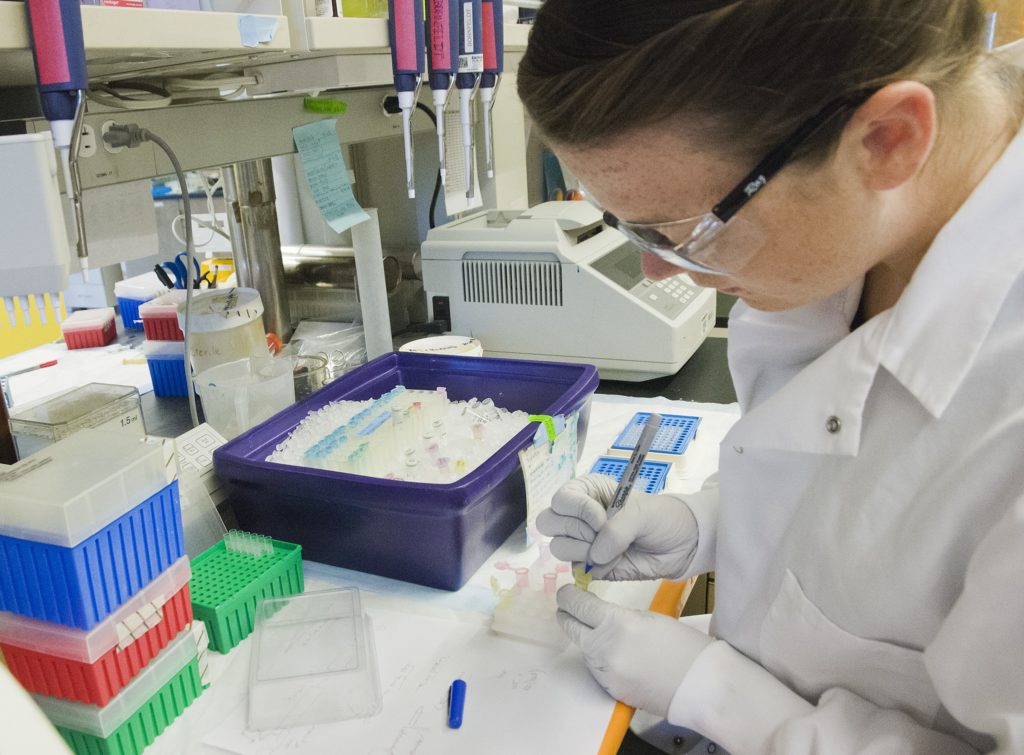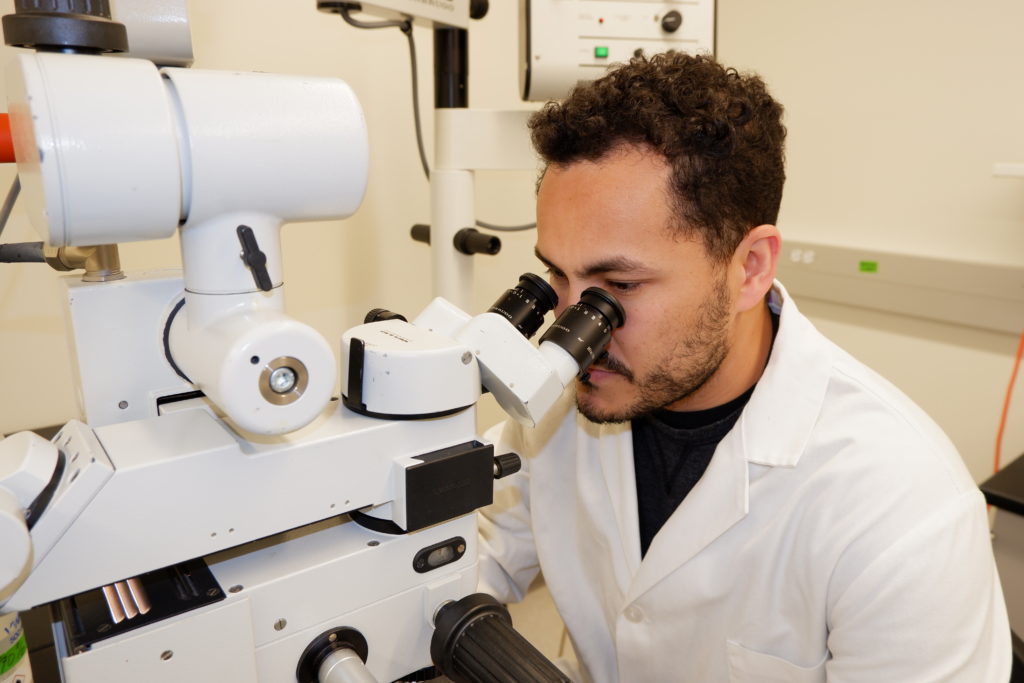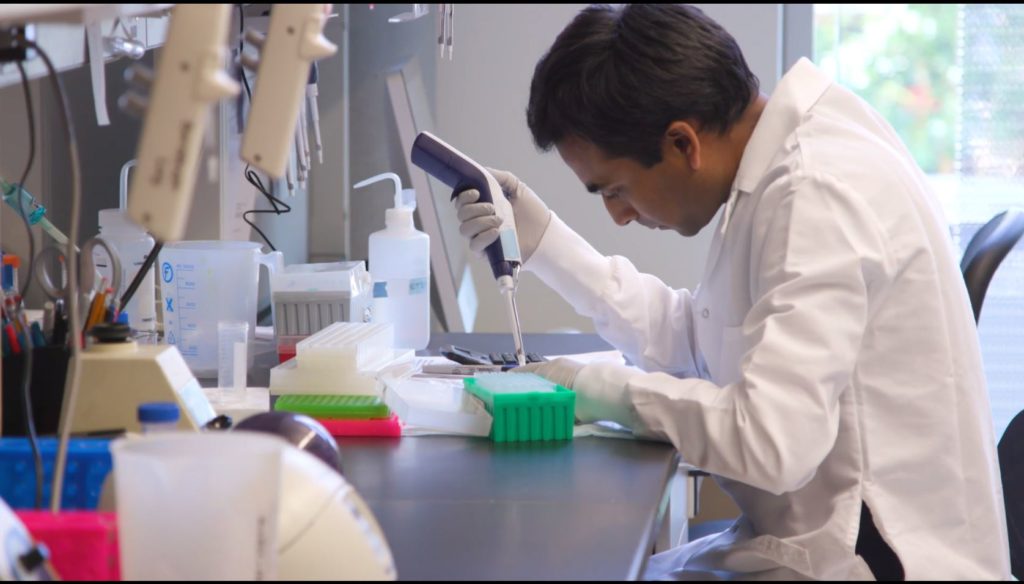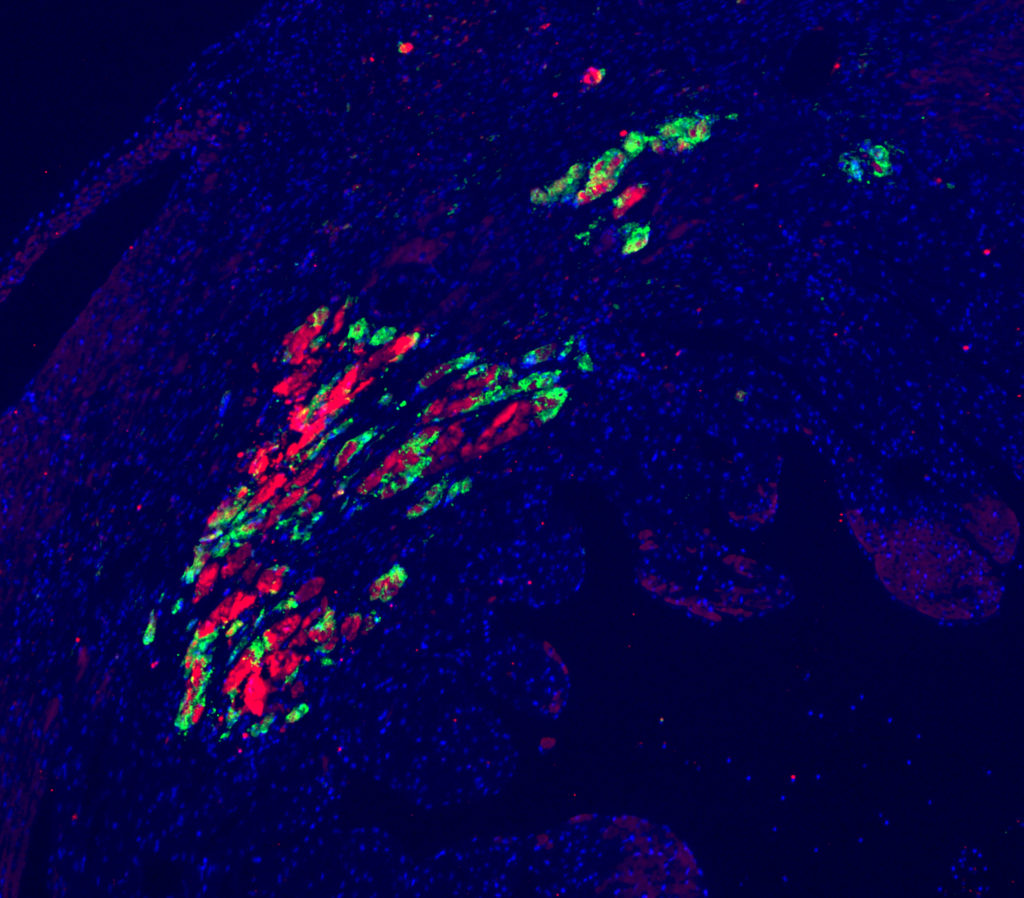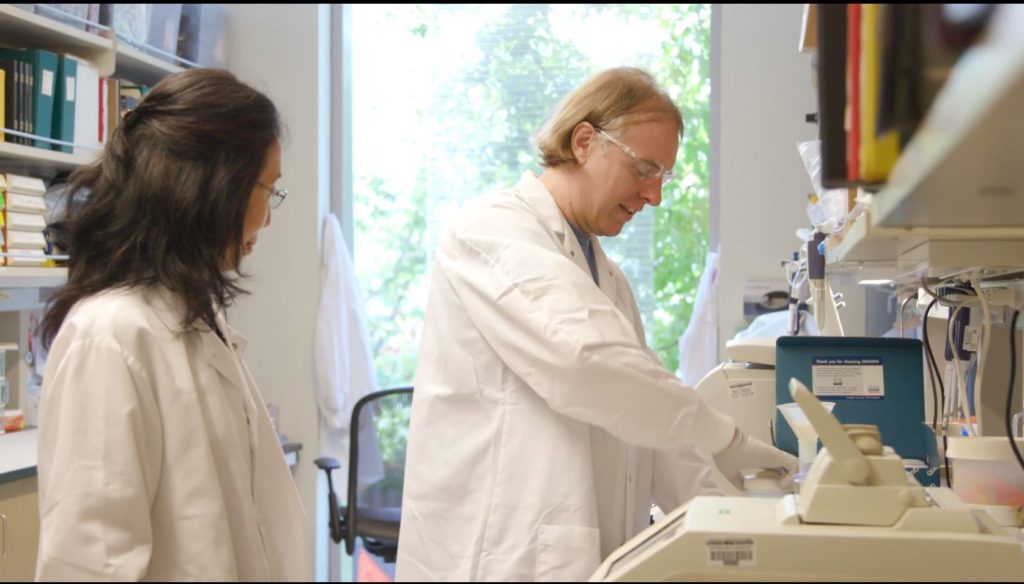Our Diabetes Complications Program Research Areas
Diabetes is a persistent condition affecting many millions of people in the U.S. and worldwide. With good care and commitment, diabetes can be well managed. Our program covers cardiovascular complications, kidney complications, and eye complications of type 1 and type 2 diabetes. The interactive and collaborative nature of our research team allows us to discover biomarkers and treatment and prevention strategies that are effective in targeting several diabetes complications simultaneously.




Preventing cardiovascular complications of diabetes
We are researching multiple areas with the goal of preventing cardiovascular complications of diabetes, such as heart attack and stroke. One of our interactive teams is investigating the possibility of improving lipid levels and inhibiting low-grade inflammation often associated with diabetes in order to prevent atherosclerosis, the leading cause of heart attack and stroke. Other members of the program work on discovering biomarkers and improved imaging techniques, so that people at increased risk of cardiovascular complications can be identified and prevention strategies can be initiated based on the particular risk factors present. We also research new approaches to heal hearts once damaged by a heart attack. Our research covers both the heart and blood vessels affected by diabetes.
Preventing kidney complications of diabetes
The goal of our research is to prevent kidney complications of type 1 and type 2 diabetes, because kidney complications can lead not only to loss of kidney function but can also increase the risk of developing cardiovascular complications. We are discovering biomarkers of diabetic kidney disease, so that kidney complications can be prevented. A particular area of interest is the use of compositional changes of lipoproteins as biomarkers of increased risk of kidney complications. Lipoprotein composition is carefully mapped by mass spectrometry after a simple blood draw.
Preventing eye complications of diabetes
New technologies and treatment and prevention pathways for eye complications associated with diabetes are investigated by several members of our research team. Novel technologies involve improved imaging of the eye and its blood supply. Mechanistic studies are carried out to identify new treatment options and new avenues to prevent diabetic eye complications.
Cardiovascular Complications of Diabetes

Karin Bornfeldt, PhD
View Profile
Associate Director for Research and
Director, Complications of Diabetes Program, UW Diabetes Institute
Professor of Medicine and of Pathology
Division of Metabolism, Endocrinology and Nutrition

Ken Fujise, MD
View Department Profile
My team and I have focused on molecular biology and translational research of fortilin, a multifunctional
molecule. Fortilin is known to protect β-cells against stress and allow them to expand
as insulin requirement increases due to either weight gain or growth. In addition, fortilin drives
macrophages to take on oxidized LDL to become foam cells. My lab is the first to report that
fortilin facilitates atherosclerosis. We have condition-ready fortilin KO mice in stock in my
laboratory and look forward to collaborating with the distinguished faculty in the Institute.

Thomas Hatsukami, MD
View Department Profile
Dr. Chun Yuan, Professor in Radiology, and I co-direct the Vascular Imaging Laboratory at South Lake Union, and we have had a 20-year history of collaboration focused on the development and application of novel magnetic resonance imaging (MRI) techniques for characterization of cerebral and peripheral vascular disease. We are using these MRI techniques in prospective clinical studies to examine mechanisms of atherosclerosis progression, plaque features that are associated with an increased risk for stroke, and response to novel endovascular therapy aimed at reducing rates of arterial re-occlusion. We look forward to opportunities to collaborate with investigators at SLU to examine mechanisms of accelerated atherosclerosis progression and development of high-risk plaque amongst individuals with diabetes.

Yi He, PhD
View Profile
Assistant Professor of Medicine
Division of Metabolism, Endocrinology and Nutrition

Jay Heinecke, MD
View Profile
Professor of Medicine
Division of Metabolism, Endocrinology and Nutrition

Andy Hoofnagle, MD, PhD
View Department Profile
As clinical and analytical chemists, the Hoofnagle laboratory applies analytical chemistry and complex workflows to investigations of diabetes from the pilot to the epidemiological scale.

Jenny Kanter, PhD
View Profile
Associate Professor of Medicine
Division of Metabolism, Endocrinology and Nutrition

Charles Murry, MD, PhD
View Department Profile
My laboratory studies stem cell biology and cardiovascular disease. Ongoing investigations include the role of metabolic substrate use, energy-sensing and mitochondrial turnover in maturation of stem cell-derived cardiomyocytes. Our long term goals are to develop therapies to induce myocardial regeneration to prevent and reverse heart failure.

Chongren Tang, PhD
View Profile
Assistant Professor of Medicine
Division of Metabolism, Endocrinology and Nutrition

Rong Tian, MD, PhD
View Department Profile
Dr. Tian is interested in the mechanistic role of mitochondrial function and metabolism in the development of diabetes complications

Thomas Vaisar, PhD
View Profile
Associate Professor of Medicine
Division of Metabolism, Endocrinology and Nutrition

Hunter Wessells, MD
View Department Profile
I lead a multidisciplinary team assessing the burden and impact of urological disorders associated with Type 1 diabetes, through an ancillary study of the Diabetes Control and Complications Trial/Epidemiology of Diabetes Intervention and Complication. My goal has been to understand the interaction of the genomic, metabolic, hormonal and epigenetic milieus of patients with diabetic complications. My current interest is in designing studies to identify high risk individuals and intervene with evidence based measures to reduce the risk of onset or worsening of symptoms.

Chun Yuan, PhD
View Department Profile
Dr. Yuan's research in vessel wall and atherosclerosis imaging has direct applications related to diabetes. Diabetics have a much higher rate disease. Heart and blood vessel disease, cholesterol, and blood pressure are common risk factors associated with diabetes. Dr. Yuan's research into these factors benefits our understanding of the development and etiology of atherosclerosis in diabetics as well as the general population.

Xue-Qiao Zhao, MD
View Department Profile
I have a long-standing interest in atherosclerosis and myocardial biology in diabetes. Currently, I have research studies in the following areas: lower extremity vascular disease in diabetes, myocardial fibrosis and SGLT-2 inhibition on its progression, and mitochondrial function in diabetes.
Kidney Complications of Diabetes

Charles Alpers, MD
View Department Profile
My research employs morphologic studies that utilize human renal biopsies to validate in human diseases the insights gained from studies of animal models. Examples of this include studies on platelet-derived growth factor (PDGF) and their receptors, vascular endothelial growth factor (VEGF), osteopontin, cell cycle regulatory proteins, and matrix proteins in diabetic nephropathy. We continue to characterize the BTBR ob/ob mouse model of diabetic nephropathy and other diabetic complications, including elucidating mechanisms underlying the role of podocyte regeneration in the regression of diabetic nephropathy that can be induced in this model. My lab is then translating these findings into comparable studies in humans using renal biopsies accessioned at the University of Washington.

Ian de Boer, MD
View Department Profile
Dr. de Boer’s research focuses on the causes and consequences of diabetic kidney disease. His work ranges from epidemiology documenting the prevalence and risk factors for diabetic kidney disease, physiology studies designed to understand the underlying mechanisms of kidney disease, and clinical trials testing interventions to prevent and treat diabetic kidney disease. He practices clinical nephrology at the Puget Sound VA Medical Center.

Jonathan Himmelfarb, MD
View Department Profile
I have been an independently funded NIH investigator for over twenty years, with a consistent focus on conducting clinical and translational research targeting the major complications of kidney disease, including diabetic kidney disease (DKD). This includes epidemiologic studies, longitudinal cohort studies, clinical trials, and in vitro studies of human organoids and organs on chips , and kidney precision medicine studies emphasizing molecular pathogenesis of DKD. The goals are to find new diagnostics and therapeutics that can delay ,prevent of cure DKD

Baohai Shao, PhD
View Profile
Assistant Professor of Medicine
Division of Metabolism, Endocrinology and Nutrition

Stuart J. Shankland, MD, MBA
View Department Profile
We study how diabetes injures the kidney glomerulus, with a focus on cell death and fibrosis. We also study the role of resident stem cells to replace cells called Podocytes that are lost in diabetes, as these cannot self-renew. Their replacement is critical to limit proteinuria and glomerular scarring.
Eye Complications of Diabetes

James Hurley, PhD
View Department Profile
Dr. Hurley’s research focuses on energy metabolism in the retina. He and his colleagues are studying metabolic relationships between cell types in the eye with a focus on how glucose from the blood reaches the retina and the roles that glycolysis and respiration play in the viability and function of retinal neurons and glia.

Aaron Lee, MD, MSCI
View Department Profile
Aaron Y. Lee MD MSCI is interested in using advanced computational techniques including deep learning to advance scientific understanding of diseases and solve disparities in diabetic eye care

Cecilia Lee, MD, MS
View Department Profile
As a medical retina and uveitis specialist, my research interests include Big Data, clinical epidemiology, and non-invasive ophthalmic imaging. I am interested in using large datasets to study potential ophthalmic biomarkers that are predictive of development, progression, and outcome of diabetic retinopathy.

Lisa Olmos de Koo, MD, MBA
View Department Profile
Dr. Olmos’ clinical research interests relate to all aspects of diabetic retinopathy, from prevention and screening via telemedicine to optimizing surgical techniques for the repair of the most complex retinal damage due to proliferative diabetic retinopathy. She is currently the physician lead for the UW Diabetic Retinopathy Screening PATH project. Additionally, she is the ophthalmic primary investigator on the Epidemiology of Diabetes Interventions and Complications (EDIC) study at the University of Washington and sits on the national Diabetes Control and Complications Trial (DCCT) / EDIC Ophthalmology Working Group (OWG).

Kathryn Pepple, MD, PhD
View Department Profile
I am a clinician scientist specializing in the medical management of retinal and inflammatory diseases of the eye. Diabetes is a leading cause of retinal vascular disease, and inflammation contributes to disease severity. My laboratory studies the role of neutrophil extracellular traps (NETs) in ocular inflammation and how combined systemic and intraocular infection leads to chronic T cell mediated autoimmune uveitis. My clinical studies focus on developing non-invasive imaging techniques for use in the diagnosis and management of patients with vascular and inflammatory diseases of the retina and choroid.

Kasra Rezaei, MD
View Department Profile
Ocular imaging is very important for early diagnosis and better manegement of diabetic retinopathy, ultra-wide field OCTA is a non invasive imaging modality that can be used for better management/monitoring of different stages of diabetic retinopathy. With collboration with department of Bio-engeering and Dr. Wangs' lab we are leading the innovation in ocular imaging.
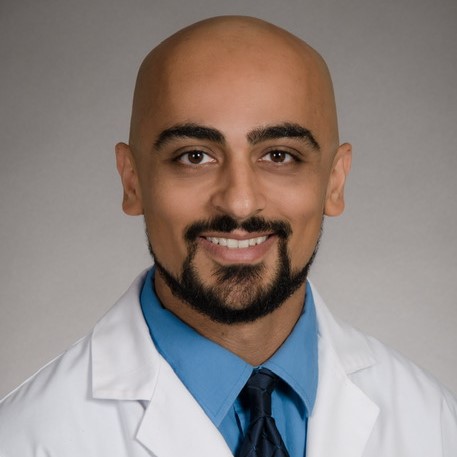
Steven Saraf, MD
View Department Profile
Dr. Saraf’s research interests include advanced imaging techniques in diabetic retinopathy. He aims to apply optical coherence tomography angiography to more quantitatively assess the degree of capillary nonperfusion and/or neovascular growth in diabetic eyes. Such information may allow better understanding of the risk of disease progression and guide treatments to stabilize or reverse the complications of diabetic retinopathy.

Ruikang Wang, PhD
View Department Profile
My research is focused on developing novel and clinically useful biomedical imaging techniques for early diagnosis, treatment and management of human diseases including Diabetes. Specific research areas of interests include:
• Functional optical imaging using coherence gating (OCT) and confocal gating techniques
• Photoacoustic imaging
• Laser Doppler, speckle and intrinsic optical signal imaging
• Development of imaging technologies from bench to bedside.

